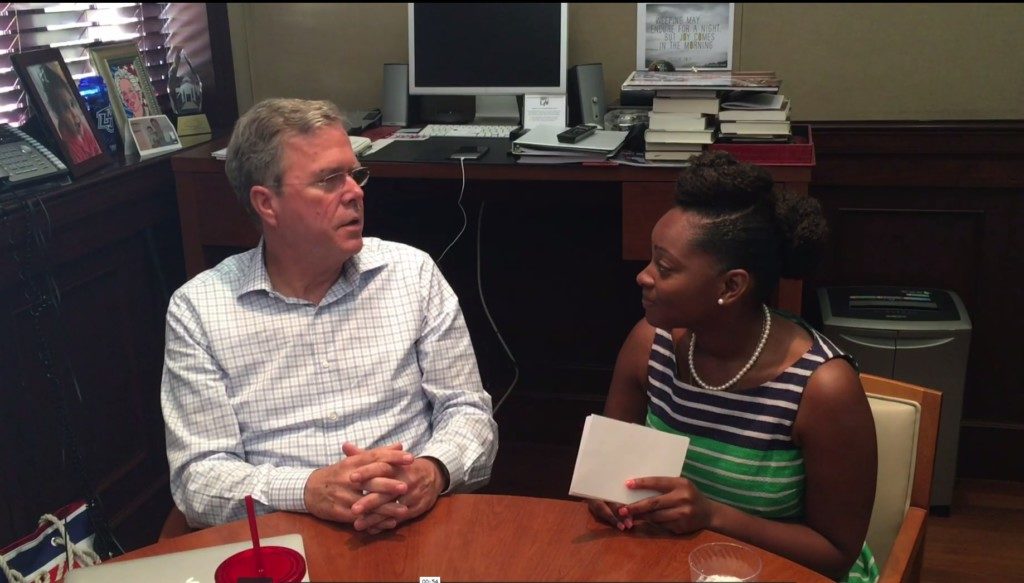
When it comes to politics, I’m not alone. Many members of my generation don’t align with either major political party. Our views don’t always fit the traditional left-right mold. But we also aren’t tied to the status quo. We are willing to break from tradition to make a difference.
Our willingness to embrace change is one cause for optimism that Jeb Bush said he found in this crazy political season. In a new interview, we talked about education politics, the importance of creating new educational options, and what politicians might learn if they spent more time in the classroom.
The former Florida governor says that on the campaign trail, he saw a backlash against some aspects of education reform. The solution, he said, is to use a bottom-up approach that puts more power in the hands of parents by giving them more choices and better information.
“If you start with the premise that this about educating children, and families are the most important political jurisdiction for their child – to be nerdy about it – the money would follow the child, not the school system,” he said.
One promising way to do that, he said, is to give parents education savings accounts, which will allow them to send their children to public schools or private schools, or to teach their children at home, or hire tutors and therapists, or even (my favorite) save for college.
While running for president, he released a plan that would have allowed states to create ESAs that could help parents pay for every stage of their child’s education, from preschool to grad school. And it would have given low-income parents direct control of federal Title I dollars that would have gone to their child’s school.
As I think about my own student loans, the notion that ESAs could be used to save for higher ed certainly piques my interest.
Bush has returned to his role as chairman of the Foundation for Excellence in Education, and he said one of the organization’s top priorities is identifying states that are prepared to be “bold” about creating ESA programs. Scholars were talking in the late 1970s about an idea that sounded a lot like education savings accounts, but nothing came of it. Fortunately, this new iteration of the concept does not seem to be lying dormant.
Some opponents of school choice have implied low-income parents don’t know enough to pick the best school for their child. All too often, people who oppose giving them options have a patronizing attitude.
Educators need to respect the ability of low-income parents to decide what’s best for their children, Bush said.
“The government doesn’t trust people near or at the poverty level,” he said. “For some reason they think they are stupid. They’re just poor. ”
To make those decisions, he said, all parents need better information, like a report card on the schools in their area, and detailed information on how their own children are progressing, so they’ll know which schools might be a good fit. This isn’t exactly a radical new invention. But for most parents, that simply doesn’t exist, and it should.
Parents need to be informed of the options that exist around them. If they don’t have that information, they’ll probably send their kids to the school that’s right around the corner, the one the bus goes to, even if they may be better off somewhere else – like I was.
Bush said that when he was governor, he sat in courtrooms hearing family law cases to learn about problems in the state’s child welfare system. To learn about education, he visited hundreds of schools around the state. He joined principals knocking on the doors of children who were chronically absent, and spent time in teachers’ lounges.
“They thought I had horns because I was for vouchers, but I learned a lot from them,” he said of the educators he met in public schools. “They’re not the problem. It’s the system that’s not working.”
Everybody has their plan or their theory or their own advice to give, but many times, politicians don’t actually have first-hand knowledge when they make decisions that can change children’s lives. If they spent more time in schools, or talking to low-income families about their kids, that might help pull education out of the ugly vortex that’s consuming national politics.
“Don’t you think that there should be a left-right coalition for reform, when you’re empowering low-income families?” Bush asked during our interview. “I don’t think that has to be a Democrat issue or a Republican issue.”
Gov. Bush has been advocating for school choice for more than 20 years now, and his zeal doesn’t seem to be fading.
Editor’s note: Check out our podcast on iTunes.



Perfecto…
As a retired teacher I wanted parental involvement to be students coming to school ready to learn having had a good breakfast, a good night’s sleep, having done their homework, having read for 30 minutes and having had a hug. Then I could continue the process and do my job. Thanks to Jeb. I appreciate your caring and dedication.
Oh please. Jeb? Does anyone think he gives a damn about kids?
The bottom-up concept is nothing new but, it is nice to hear Gov. Bush talk about a bottoms-up approach as a solution to many problems we have in our society. This looks like parents being empowered to take advantage of the best educational opportunity for their child. As parents choose the best options for their child, I believe, many schools will be pushed to become higher-quality. Thank you for your supportive comment.
Since he spearheaded and pushed through a number of school choice programs when he was governor — all of which have been very beneficial to tens of thousands of children and their families — your comment is unfair and uninformed. Who do you think “gives a damn” about kids — the left, and the teachers union that owns them??? Oh, please….